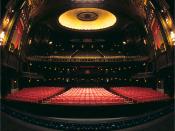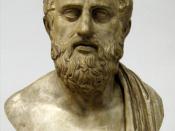Theater has been an integral part of almost every society for thousands of years. Starting in the last Sixth century B.C. Theater has been evolving into the glitzy, whirlwind productions of today. But in the beginning, theater was a simple affair. Originating in Greece, theater tradition was derived from religious rituals. The ceremonies of the cult of Dionysus were exuberant; much story telling took place in the form of song and dance. Everyone would partake in the story telling, forming what is known as the chorus. The first man to step out of the chorus and take a role of a character was the poet Thespis. It was his idea to include a character that could partake in dialog that revolutionized theater, as it is known today. From the first time Thespis stepped into a character, the Greeks adored the idea of physically acting out their stories. Eventually, drama and theater were integrated into two festivals of Dionyssos, the Lenea festival in January and the Great Dionyssia in March.
Poets could enter a series of four plays (three tragedies and a comedy) to be judged by five judges. Only three poets were allowed to enter these two contests per year. The Honorable Archon chose the three participants. The poets and actors were paid by the state, but sponsored by a rich Athenian, a primitive producer. It brought great honor to the producer if the play he was sponsoring took first place at one of the two contests. It was the sponsor who paid for the tickets to fill the entire theater, for everyone could see the play for free. That allowed the poorest people in the Athenian nation to enjoy theater along with the richest.
Plays were rarely written down, they were recorded by memorization, or oral tradition. Thus, many...



Good for your level
you could benefit from better use of description. make it more interesting for people to read. otherwise, clear presentation of facts etc, but some paragraphs were too short, some too drawn out. paragraph structure was reasonable and your essay flowed well, but i would have appreciated more information in some areas and could have done with less in other areas.
2 out of 2 people found this comment useful.